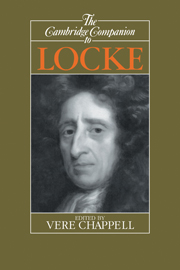Book contents
- Frontmatter
- Introduction
- 1 Locke's life and times
- 2 Locke's theory of ideas
- 3 Locke's philosophy of body
- 4 Locke's philosophy of mind
- 5 Locke's philosophy of language
- 6 Locke's theory of knowledge
- 7 Locke's philosophy of religion
- 8 Locke's moral philosophy
- 9 Locke's political philosophy
- 10 Locke's influence
- Bibliography
- Index
Introduction
Published online by Cambridge University Press: 28 May 2006
- Frontmatter
- Introduction
- 1 Locke's life and times
- 2 Locke's theory of ideas
- 3 Locke's philosophy of body
- 4 Locke's philosophy of mind
- 5 Locke's philosophy of language
- 6 Locke's theory of knowledge
- 7 Locke's philosophy of religion
- 8 Locke's moral philosophy
- 9 Locke's political philosophy
- 10 Locke's influence
- Bibliography
- Index
Summary
The main subject of this book is Locke's philosophy, in the current academic sense of that term. So construed, philosophy is a special field of inquiry, marked off, even if not very clearly, from other fields and in particular from the various empirical sciences. Locke certainly practiced philosophy understood in this way. But he did not think of himself as any kind of intellectual specialist. He rarely even used the word “philosophy,” as many seventeenth-century thinkers did, to signify the whole domain of intellectual endeavor: his favorite word for that was “science.” And in addition to his work in philosophy, he pursued substantial inquiries in other disciplines: chemistry, medicine, economics, public policy, education, and theology. Still, there is no doubt that Locke's most significant as well as his most influential achievements were in philosophy; and it is as a philosopher that he is chiefly interesting to scholars today.
Philosophy, in our current view of it, is divided into various more or less distinguishable subfields, yielding, at the first level of division, logic, epistemology, metaphysics, and moral philosophy, and then, by subdividing these, such specializations as the philosophies of language, science, mind, and religion, ethical theory, and political philosophy. Locke worked actively in nearly all of these areas. It is true that the overall subject of his two most important books, the Essay concerning Human Understanding and the Two Treatises of Government, is, in the one case, epistemology and, in the other, political philosophy. But there are also significant excursions, in the Two Treatises, into general moral philosophy, and in the Essay, into ethical theory and the philosophies of language, science, and religion, and especially into what we call metaphysics, though Locke would have been uneasy with that label, reeking as it did to his nose of the stale hallways of medieval schools.
- Type
- Chapter
- Information
- The Cambridge Companion to Locke , pp. 1 - 4Publisher: Cambridge University PressPrint publication year: 1994

